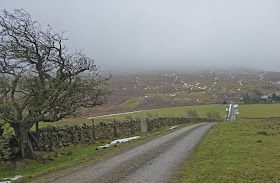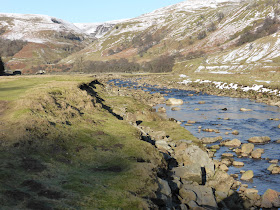It is rare for my advice to be in demand but Gimmer was house hunting. I was invited to a viewing so I could give a second opinion.
Selfishly I looked at the location on the map and saw it was close to one of my remaining five Marilyns in Area 35 - Dufton Pike.
The viewing was interesting enhanced by history of previous occupants including a bishop. We were shown round by a neighbour who had been employed as a sort of housekeeper manager for over forty years by various occupants. She was our initial source of history and also reminiscences about visitors to the attached coach house which provides a self catering venue, including memories of a celebrated journalist who had been a regular visitor. After that we had tea with the eighty-six year old refined lady owner who was recovering from a knee replacement operation, and she pleasantly entertained us with further stories.
The house was superbly located and full of character. There were issues, and having known Gimmer since schooldays I gave my honest opinion.
We made a steady ascent of Dufton Pike by the south-east ridge finishing off in a long deep snow drift to arrive at the satisfyingly pointy summit. Cloud swirled and partially cleared intermittently giving fleeting views through windows into fairyland.
Descent down the north-west ridge and back along tracks above Great Rundale Beck completed our enjoyable circle.
Back in Dufton it was four o' clockish. At the Stag Inn a dangling sign on the door said "open". We tried the door to no avail then the landlord came, opened the door, and told us rudely that they didn't open until six, and when we pointed to the sign he said he had forgotten to change it then shut the door. He hadn't bothered to alter the sign.
In contrast we drove to Appleby and sat in the comfortable lounge of the Tufton Arms Hotel, a quintessential, old established English inn catering mainly for the wealthy sporting gentry. Tea and lemon drizzle cake in such relaxing surroundings made us reluctant to leave. I think of myself as a "doer", but the idea of booking in there for a week and "doing" nothing seemed appealing.
PLEASE CLICK FIRST PHOTO TO ENLARGE
 |
| Dufton Pike from the Pennine Way path just out of Dufton |
 |
Sir Hugh approaching the summit...
"last seen..."
Photo couretesy of Gimmer |
 |
| The ravine of Great Rundale Beck. I visited there to find a geocache with Pete, my Thursday walking pal, a few years ago and then to the trig point on the summit above. |
 |
| As above but a bit more arty |
 |
| The distant Lake District hills just visible (enlargement click is worthwhile) |
 |
| Knock Pike |
I owe my success to having listened respectfully to the very best advice, and then going away and doing the exact opposite. G. K. Chesterton




























